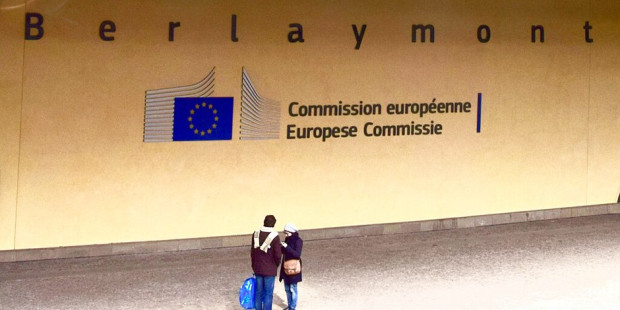Series (7) – European money for the Mafia?
Today - And what does the European Commission say? No, the European Commission did not really answer our questions, and it must have good reasons for that...
 When the powerful people team up, the simple European citizen becomes smaller and smaller... Foto: Ank Kumar / Wikimedia Commons / CC-BY-SA 4.0int
When the powerful people team up, the simple European citizen becomes smaller and smaller... Foto: Ank Kumar / Wikimedia Commons / CC-BY-SA 4.0int
(Kai Littmann) – After months of research, we had sent six questions to the European Commission in order to better understand how it was possible that over decades, part of the money invested in the projects of gas pipelines in Italy ended up in the coffers of organised crime in Italy. We naively assumed that the European Commission would explain the procedures to us and, above all, how it intends to prevent such incidents in the future. But instead of giving us answers, a staff member of the communication department provided us with information about the financing of the TAP pipeline project, which basically confirmed the partial financing of the TAP project as part of a financial package involving various European funds. Our questions about the cooperation of the European institutions with Italian partners close to organised crime were unfortunately not answered, nor was our question about the means by which the European Commission intends to prevent European funds from ending up in the pockets of organised crime in Italy in the future.
Here are the questions we had sent to Brussels, first to the Directorate-General for ENERGY, but then these questions were on the move for four weeks like a hot potato between the Commission’s communications departments:
1. Did the European Commission know about the frauds committed by its partners within the Italian structure [ENI - SNAM - Bonatti, e.n.]?
2. Was the European Commission aware that Bonatti’s subcontractors (who were not paid in full for their work) had been bringing legal proceedings against “il sistema” for 26 years and that the Italian legal system had not worked correctly in this context (unprocessed cases, corrupt judges, refusal of the Court of Cassation to pass judgment, etc.)?
2a. If so, what were the reactions of the European Commission?
2b. If not, how were the project, budget and progress monitored?
3. Who reported to the European Commission? ENI, SNAM, SNAM Progetti, Bonatti? How were the reports of the Italian partners verified?
4. Given the amounts of money involved and the fact that the links of at least SNAM and Bonatti to organised crime are proven by numerous uncontradicted publications, the monitoring of the budgets should have been particularly careful. Can you describe the process of monitoring the different tranches of the gas pipeline projects in Italy? How often, in terms of content and depth, were the projects in Italy reported on? How were these reports reviewed and by whom?
5. What means does the European Commission have of forcing the Italian partners to comply with the “Anti-Mafia Law”, penalising breaches of that law and ensuring that the general contractors’ subcontractors are paid?
6. What means does the European Commission have of ensuring that European funds no longer disappear into the coffers of organised crime in Italy?
As a Commission spokeswoman tells us, the “Trans-Adriatic Pipeline” (TAP) is one of the “projects of common interest”, as we have already explained in an earlier article in this series. The Commission, on the other hand, again according to the spokesperson, has only financed €14 million for feasibility studies and she stresses that the Commission has not financed or co-financed any construction work, engineering services or procurement of materials. This work was carried out by the “Trans Adriatic Pipeline AG”, a consortium including SNAM S.p.A., whose links to organised crime in Italy have been documented by numerous publications and which is nevertheless still one of the partners of the European institutions.
Even though the Commission’s direct contribution (through the “Connecting Europe Facility”) is limited to €14 million, European money has nevertheless been mobilised for this project. 688 million € guarantee by the “European Fund for Strategic Investments” (EFSI), 500 million € loan by the “European Bank for Reconstruction and Development”, 500 million € by commercial banks. This concerns “only” the TAP pipeline, no figures were provided on the “Trans Mediterranean Pipeline” (TMP). And this information does not change the fact that in the framework of this project, the “Anti-Mafia Law” has been violated, entrepreneurs have been harmed and destroyed and that obviously nobody cares about this.
We would have liked the Commission to answer our questions and to comment on the connection of some of its partners with organised crime. Brussels has a whole arsenal of measures that the Commission can apply if recipients of EU funds violate laws such as the “Anti-Mafia Law” (Legge 1990/55). These measures can go as far as the withdrawal of contracts. Apparently, however, these links to organised crime do not shock Brussels too much.
In the next article we will show a concrete example. Contractor Rosario Leo and his companies have been destroyed by “il sistema” and for 26 years, the man has been fighting for justice to be served and organised crime to be dismantled. He is unlikely to find any support in Brussels in his quest for justice….a
Already published in this series:
Article 0
Article 1
Article 2 (special issue)
Article 3
Article 4
Article 5
Article 6

Kommentar hinterlassen